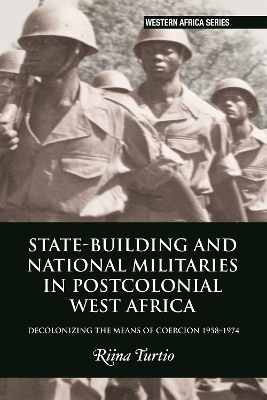
State-building and National Militaries in Postcolonial West Africa
James Currey (Verlag)
978-1-84701-342-2 (ISBN)
How did African armed forces in postcolonial states in francophone West Africa influence decolonization and state-building in African states? How did foreign assistance from ex-colonial powers, the USSR and the US and colonial state structures influence political systems, and sometimes result in weak and unstable governance? This book explores the development of national militaries in Cote d'Ivoire, Dahomey (now Benin), Guinea, Mali, Mauritania, Niger, Senegal, Upper Volta (now Burkina Faso) and Togo during the 1960s and 1970s. Revealing the strength of decision-making power by African political elites, the study also shows the decisive impact of foreign economic and military assistance on countries that did not experience a prolonged armed conflict. The author provides new insights into the way the decisions of African governments in building their national militaries impacted postcolonial states' autonomy, legitimacy, sovereign control and governance.
In West Africa, during the 1960s, France sought to maintain exclusive relations with its former colonies through military assistance, economic aid and close personal relations with African political and military elites. State coercive capacities extended far beyond the strength of political institutions, with soldiers' assumption of political roles linked to the weaknesses of colonial and postcolonial structures. Disagreements between French and American officials, as well as Arab-Israeli and Sino-Russo conflicts, increased African presidents' opportunities to mobilize external resources. Yet in the late 1980s, it became evident that national militaries and police were often the main causes of personal insecurity, rather than providing protection, and that some economies remained weak and political structures unstable.
This book is available as an Open Access ebook under the Creative Commons license CC-BY-NC. The open access version of this publication was funded by the Swiss National Science Foundation.
RIINA TURTIO is a Visiting Researcher and Lecturer at the University of Helsinki. Previously, she was a Lecturer at the Paris School of international affairs and a Research Fellow at Harvard University.
1. Introduction
Peaceful decolonisation and the Cold War
Armed Forces and State Building: The Development of National Militaries in West Africa
Sources and Methodology
Objectives and Structure of the book
2. Autonomy: Foreign Assistance and African Decision-making
Pros and Cons of Neutralism: The Reliance of Guinea and Mali on the Soviet Union
Life Insurance: French Relations with the Presidents of Côte d'Ivoire and Senegal
Surviving on Leftovers: Building National Militaries with Limited Resources
French know-how and strategic minerals: Nigerien defense decisions
Conclusion
3. Sovereignty: Strategies to Control Populations and Territories
Coopting States: Côte d'Ivoire and Senegal
Coercive States: Guinea and Mali
Centralized States: Niger and Upper Volta
Conclusion
4. Legitimacy and Colonial Legacies: The Use of Force and Institutions of Coercion
Blood Tax: West African Soldiers in the French Army
From 'Mercenaries' to People's Armed Force: Military Building in Guinea
Relying on France: Continuity in Colonial Structures in Côte d'Ivoire
A Reverence for Warriors: The Postcolonial Importance of Soldiers in Upper Volta
Conclusion
5. Governance: Control and Command of the Armed Forces
A Revolutionary Army Eats Itself: The Soviet Model in Guinea and Mali
Economic Liberalism v. Multiparty Democracy: Ivorian and Senegalese Decision-making
Nigerien and Voltaic Soldiers: Guardians of the Treasury?
Conclusion
6. Conclusion: Legacies of Control
| Erscheinungsdatum | 12.12.2022 |
|---|---|
| Reihe/Serie | Western Africa Series |
| Zusatzinfo | 1 Maps |
| Verlagsort | Oxford |
| Sprache | englisch |
| Maße | 156 x 234 mm |
| Gewicht | 554 g |
| Themenwelt | Geschichte ► Teilgebiete der Geschichte ► Militärgeschichte |
| Geschichte ► Teilgebiete der Geschichte ► Wirtschaftsgeschichte | |
| ISBN-10 | 1-84701-342-2 / 1847013422 |
| ISBN-13 | 978-1-84701-342-2 / 9781847013422 |
| Zustand | Neuware |
| Haben Sie eine Frage zum Produkt? |
aus dem Bereich


